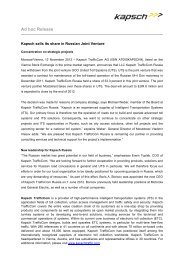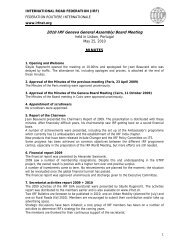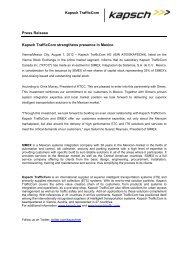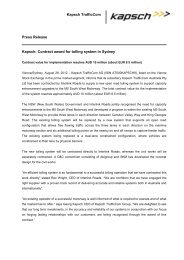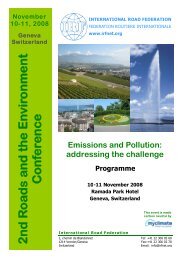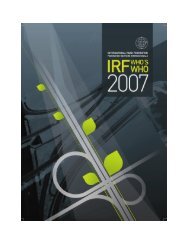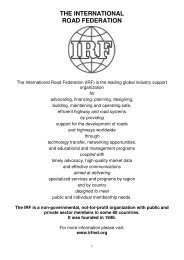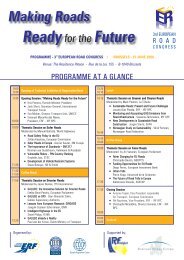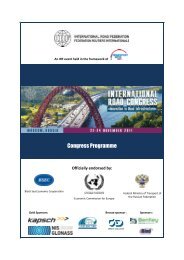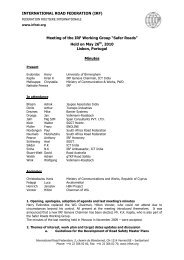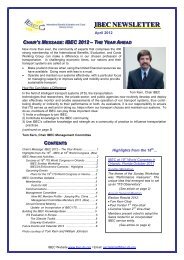Motorways and Urban Mobility - International Road Federation
Motorways and Urban Mobility - International Road Federation
Motorways and Urban Mobility - International Road Federation
Create successful ePaper yourself
Turn your PDF publications into a flip-book with our unique Google optimized e-Paper software.
Common issues<br />
The case study work also led the Working Group to conclude<br />
that there are a number of issues that are common to most,<br />
if not all, urban PPP projects. These include willingness<br />
of users to pay for urban tolls, a wide enough choice of<br />
competent companies to stimulate the best competitive<br />
bids, <strong>and</strong> the need for sufficient capacity on the part of<br />
the governmental agencies <strong>and</strong> contractors concerned to<br />
manage complex urban road projects.<br />
The latter not only implies possessing the requisite<br />
knowledge <strong>and</strong> experience but also having the right<br />
mentality. Compared to a traditionally procured project, for<br />
example, the authority has less technical involvement <strong>and</strong><br />
needs to take on more of an auditing/monitoring role.<br />
All these issues <strong>and</strong> more are being actively explored in the<br />
ongoing activities of IRF’s PPP Working Group. If you would<br />
like to know more, please contact Caroline Visser at cvisser@<br />
irfnet.org.<br />
Public-Private Partnerships<br />
in Public Transport in Indian<br />
Cities<br />
Amitava Basu<br />
President, Intercontinental Consultants <strong>and</strong><br />
Technocrats Private Limited, New Delhi, India<br />
Recognising the importance of efficient urban transport –<br />
notably in the light of escalating populations <strong>and</strong> the fact<br />
that urban centres currently contribute over 60% of GDP<br />
– the Government of India has drawn up a National <strong>Urban</strong><br />
Transport Policy (NUTP) that focuses on moving people<br />
<strong>and</strong> not vehicles. It also places particular emphasis on<br />
Public-Private Partnerships (PPPs) <strong>and</strong> innovative financing<br />
methods to raise resources.<br />
Public-Private Partnership in urban transport<br />
PPP implies projects based on a contract or concession<br />
agreement between a governmental entity <strong>and</strong> a private<br />
sector company for delivering an essential service upon<br />
payment of user charges. While a PPP mechanism changes<br />
URBAN PUBLIC-PRIVATE PARTNERSHIPS<br />
the means of delivering services, it does not change the<br />
authority that is accountable for their provision. It is<br />
still the governmental entity’s obligation to provide the<br />
service required. The only change is in the role of the<br />
governmental entity, which assumes a managerial function<br />
rather than engaging in actual operations. In other words,<br />
the governmental entity is entrusted with the responsibility<br />
of being an overseer of operations rather than a resource<br />
manager.<br />
The involvement of the private sector in this domain,<br />
which has traditionally been public, is a sensitive matter.<br />
It necessitates a detailed process of consultation with the<br />
end consumers <strong>and</strong> the members of the state transport<br />
authority, not only to raise awareness but also to thoroughly<br />
gauge stakeholder concerns. The consultation is a very<br />
important step, which needs to be carried out before the<br />
bidding process is started.<br />
The state transport authority also needs to ascertain<br />
whether any approvals need to be obtained from a higher<br />
IRF BULLETIN SPECIAL EDITION: URBAN MOBILITY |<br />
12




